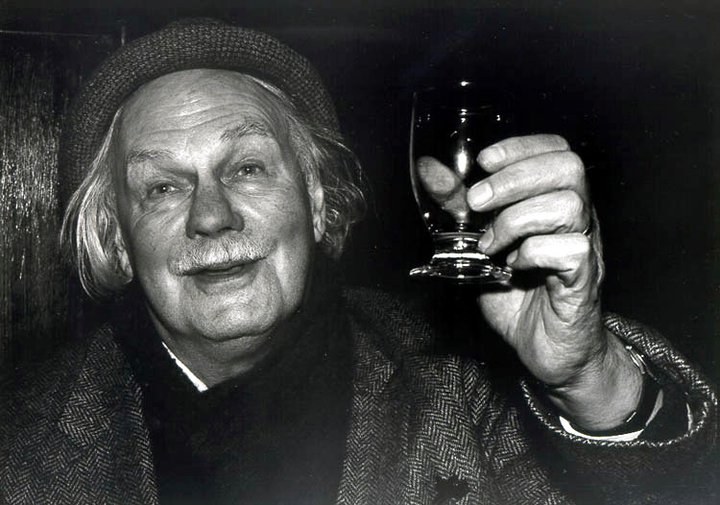Glasgow Film Festival: Hamish

On Tuesday 23rd February (GFT 6pm) the 2016 Glasgow Film Festival will play host to the world premiere of Hamish. 14 years in the making, Robbie Fraser’s film pays tribute to Scottish cultural colossus Hamish Henderson – poet, soldier, intellectual, activist and musician.
The premiere will include a musical overture featuring two of Scotland’s most respected singers, Adam McNaughton and Siobhan Miller, in association with Celtic Connections.
Hamish Henderson (1919-2002) was a hugely influential part of Scotland’s cultural scene, a man of boundless passion and curiosity whose poems continue to elevate and inspire a nation.
Hamish pays tribute to the many contrary forces and diverse facets of Henderson’s life as a poet, soldier, intellectual, activist, songwriter and leading force of the revival of Scottish folk music.

From an English orphanage and the draughty corridors of Cambridge to overseeing the capitulation of the Italian army in WWII and penning the most celebrated Scottish ballad in contemporary folk music “Freedom Come Aa Ye”, this is Henderson’s life told by those who knew him best and loved him most.
This heartfelt look at one of modern Scotland’s proudest sons weaves golden archive footage with the loving testimony of Henderson’s family, friends and colleagues.
“It’s been a privilege to work on a film about Hamish Henderson” says Robbie. “He’s a wee bit lost right now, faded from view. But he needs to be re-cemented into the Scottish imagination as a poet, a maker and an inspirer of people.
It is a very emotional film, and that comes in part because the story is told only through the words of people who knew him personally over many years. I’m pretty much the only person on the production who didn’t know him, and I wish I had. He was clearly a benevolent, adored and empowering cultural force.”
“I knew Hamish when I was a student at Edinburgh University” says the film’s writer Kevin MacNeil. “I found him and his colleagues such as John MacInnes and Margaret Bennett so inspiring I dropped my plans to study English Literature and took a degree in Scottish Ethnology instead.
It was a particular coup to hear from Hamish’s widow and daughters what living with Hamish and his influence has been like. What emerges is an honest and fascinating portrait of a complex and enormously influential man.”
The film’s original soundtrack is composed by Jim Sutherland, himself hugely influenced and encouraged by Hamish Henderson.
The film owes a great debt to the Hamish Henderson Estate and to Tim Neat for sharing many previously unseen writings, photographs and memorabilia.
About Hamish Henderson
Hamish Henderson was born on 11 November 1919 in Blairgowrie to a single mother. Hamish attended Blairgowrie High School before moving to England with his mother who sadly died before he started school at Dulwich College, London. Living in an orphanage, Hamish managed to secure a place at Cambridge where he would study modern languages.
While a student visiting Germany he acted as a courier for a Quaker network which helped refugees escape the Nazi regime, later serving with Intelligence Corp in Europe and North Africa as a translator.
His experience of war acted as a catalyst for his poem sequence Elegies For The Dead In Cyrenaica for which he received the Somerset Maugham Award in 1949. He used his prize money to fund his journey to Italy where he translated The Prison Letters Of Antonio Gramsci; given the sensitivity of the subject, it wasn’t published until years later and he was asked to leave the country.
Henderson became an integral part of the Scottish folk movement when he accompanied the American folklorist Alan Lomax on a collection tour of Scotland.
His career as a collector not only established his place as a permanent member of staff at the School of Scottish Studies but also led him to return to his native Blairgowrie, making the travellers who berry-picked in the summer his particular area of activity. He beautifully described this time as “like sitting under Niagara Falls with a tin can”.
Henderson helped establish the Edinburgh People’s Festival in 1951. It put traditional Scottish folk music on a public stage for the first time and arguably evolved into the internationally celebrated Edinburgh Festival Fringe as we know it today.
As folk clubs sprung up and modern folk songs bled into the mainstream, often these songs contained political themes and Henderson’s own compositions Freedom Come Aa Ye and The John MacLean March were written in to the fabric of Scottish culture.
In 1983 he turned down an OBE in protest of the nuclear arms policy under the Thatcher government and as a result was voted Scot Of The Year by BBC Radio Scotland listeners. He was openly bisexual and campaigned for equal rights, Scottish independence and was a strong supporter of the release of Nelson Mandela.
About Robbie Fraser
Robbie Fraser is a Scottish filmmaker, based in Glasgow. Hamish is Fraser’s fourth feature film after Gamerz (2003) and the documentaries The Bridge Rising (2013) and Family Goldmine (2014). All his films to date have been made by the support of Creative Scotland or Scottish Screen and all have found international distribution and worldwide festival exposure. This is the third year running that he has had a feature film premiere at the Glasgow Film Festival. His documentary portrait of comedian Norman Maclean won the Jury Prize at the Celtic Media Festival in 2009.
